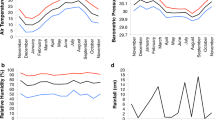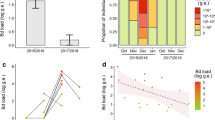Abstract
Batrachochytrium dendrobatidis is an unpredictable pathogen for European amphibian species, and existing field surveillance studies likely underestimate the scope of its distribution and effects. Mass mortality episodes recorded in Europe indicate that investigations of unstudied species should focus on members of the frog family Alytidae. Here, we report the combined results of a field survey and laboratory observations of field collected Alytes dickhilleni. Our data support the hypothesis that B. dendrobatidis has recently emerged in at least two disjunct locations in the species range and populations across much of the species range lack evidence of infection pathogen. Tadpoles taken into the laboratory from sites with infection experienced 70% mortality, unlike those taken into the laboratory from uninfected sites, and both infection and strength of infection was associated with mortality in animals collected from infected locations. Several conservation interventions are underway in response to our study, including the establishment of a captive assurance colony, a public awareness campaign, and experimental tests of disease mitigation schemes.


Similar content being viewed by others
References
Adams MJ, Galvan S, Scalera R, Grieco C, Sindaco R (2008) Batrachochytrium dendrobatidis in amphibian populations in Italy. Herpetological Review 39:324–326
Arntzen JW, García-Paris M (1995) Morphological and allozyme studies of midwife toads (Genus Alytes), including the description of two new taxa from Spain. Contributions to Zoology 65:5-34
Berger L, Speare R, Daszak P, Green DE, Cunningham AA, Goggin CL, Slocombe R, Ragan MA, Hyatt AD, McDonald KR, Hines HB, Lips KR, Marantelli G, Parkes H (1998) Chytridiomycosis causes amphibian mortality associated with population declines in the rainforests of Australia and Central America. Proceedings of the National Academy of Sciences of the United States of America. 95:9031–9036
Bielby J, Cooper N, Cunningham AA, Garner TWJ, Purvis A (2008) Predictors of rapid decline in frog species. Conservation Letters 1:82-90
Bielby J, Bovero S, Sotgiu G, Tessa G, Favelli M, Angelini C, Doglio S, Clare F, Gazzaniga E, Lapietra F, Garner TWJ (2009) Fatal chytridiomycosis in the Tyrrhenian painted frog. Ecohealth 6:27-32
Bosch J, González-Miras E (2012) Seguimiento de Alytes dickhilleni: informe final. Monografía SARE. Asociación Herpetológica Española—Ministerio de Agricultura, Alimentación y Medio Ambiente, Madrid
Bosch J, Martínez-Solano I (2006) Chytrid fungus infection related to unusual mortalities of Salamandra salamandra and Bufo bufo in the Peñalara Natural Park, Spain. Oryx 40:84–89
Bosch J, Rincón PA (2008) Chytridiomycosis-mediated expansion of Bufo bufo in a montane area of Central Spain: an indirect effect of the disease. Diversity and Distributions 14:637-643
Bosch J, Martínez-Solano I, García-Paris M (2001) Evidence of a chytrid fungus infection involved in the decline of the common midwife toad (Alytes obstetricans) in protected areas in central Spain. Biological Conservation 97: 331–337
Bosch J, Carrascal LM, Durán L, Walker S, Fisher MC, (2007) Climate change and outbreaks of amphibian chytridiomycosis in a montane area of Central Spain; is there a link? Proceedings of the Royal Society, Series B 274:253–260
Bovero S, Sotgiu G, Angelini C, Doglio S, Gazzaniga E, Cunningham AA, Garner TWJ (2008) Detection of chytridiomycosis caused by Batrachochytrium dendrobatidis in the endangered Sardinian newt Euproctus platycephalus in Southern Sardinia, Italy. Journal of Wildlife Diseases 44:712-715
Boyle DG, Boyle DB, Olsen V, Morgan JAT, Hyatt AD (2004) Rapid quantitative detection of chytridiomycosis (Batrachochytrium dendrobatidis) in amphibian samples using real-time Taqman PCR assay. Diseases of Aquatic Organisms 60:141-148
Briggs CJ, Knapp RA, Vredenburg VT (2010) Enzootic and epizootic dynamics of the chytrid fungal pathogen of amphibians. Proceedings of the National Academy of Sciences of the U.S.A 107:9695–9700
Federici S, Clemenzi S, Favelli M, Tessa G, Andreone F, Casiraghi M, Crottini A (2008) Identification of the pathogen Batrachochytrium dendrobatidis in amphibian populations of a plain area in the Northwest of Italy. Herpetology Notes 1:33- 37
Ficetola FG, Valentini A, Miaud C, Noferini A, Mazzotti S, Dejean T (2011) Batrachochytrium dendrobatidis in amphibians from the Po River Delta, Northern Italy. Acta Herpetologica 6:297-302
Fisher MC, Garner TWJ, Walker SF (2009) The global emergence of Batrachochytrium dendrobatidis in space, time and host. Annual Review of Microbiology 63:291-310
Garner TWJ, Perkins MW, Govindarajulu P, Seglie D, Walker SF, Cunningham AA, Fisher MC (2006) The emerging amphibian pathogen Batrachochytrium dendrobatidis globally infects introduced populations of the North American bullfrog, Rana catesbeiana. Biology Letters 2:455–459
Garner TWJ, Walker SF, Bosch J, Leech S, Rowcliffe JM, Cunningham AA, Fisher MC (2009a) Life history trade-offs influence mortality associated with the amphibian pathogen Batrachochytrium dendrobatidis. Oikos 118:783–791
Garner TWJ, Garcia G, Carroll B, Fisher MC (2009b) Using itraconazole to clear Batrachochytrium dendrobatidis infection and subsequent depigmentation of Alytes muletensis tadpoles. Diseases of Aquatic Organisms 83:257–260
Garner TWJ, Rowcliffe JM, Fisher MC (2011) Climate, chytridiomycosis or condition: an experimental test of amphibian survival. Global Change Biology 17:667-675.
Garner TWJ, Briggs CJ, Bielby J, Fisher MC. 2012. Determining when parasites of amphibians are conservation threats to their hosts: methods and perspectives. In: New Directions in Conservation Medicine: Applied Cases of Ecological Health, Aguirre A, Ostfeld R, Daszak P (editors), New York: Oxford University Press, pp 521-538
Gonçalves HA, Martínez-Solano I, Ferrand N, García-Paris M, (2007) Conflicting phylogenetic signal of nuclear vs. mitochondrial DNA markers in midwife toads (Anura, Discoglossidae, Alytes): deep coalescence or ancestral hybridization? Molecular Phylogenetics and Evolution 44:494-500
Lips KR, Brem F, Brenes R, Reeve JD, Alford RA, Voyles J, Carey C, Livo L, Pessier AP, Collins JP (2006) Emerging infectious disease and the loss of biodiversity in a Neotropical amphibian community. Proceedings of the National Academy of Sciences of theU.S.A. 103:3165-3170.
Lips KR, Diffendorfer J, Mendelson III JR, Sears MW. 2008. Riding the wave: Reconciling the roles of disease and climate change in amphibian declines. PLoS Biology 6:e72
Luquet E, Garner TWJ, Léna JP, Bruel C, Joly P, Lengagne T, Grolet O, Plénet S (2012) Genetic erosion in wild populations makes resistance to a pathogen more costly. Evolution 66:1942-1952
Martínez-Solano I, Bosch J, García-París M (2003) Demographic trends and community stability in a montane amphibian assemblage. Conservation Biology 17:238–244
Martínez-Solano I, Gonçalves HA, Arntzen JW, García-París M (2004) Phylogenetic relationships and biogeography of midwife toads (Discoglossidae: Alytes). Journal of Biogeography 31:603-618
Ohst T, Gräser Y, Mutschmann F, Plötner J (2011) Neue erkenntnisse zur gefährdung europäischer amphibian durch den hautpilz Batrachochytrium dendrobatidis. Zeitschrift für Feldherpetologie 18:1-17
Pasmans F, Muijsers M, Maes S, Van Rooij P, Brutyn M, Ducatelle R, Haesebrouck F, Martel A (2010) Chytridiomycosis related mortality in a midwife toad (Alytes obstetricans) in Belgium. Vlaams Diergeneeskundig Tijdschrift 79:461–463
Potthoff RF, Whittinghill M (1966) Testing for homogeinity: II. The Poisson distribution. Biometrika 53:183–190
Rachowicz LJ, Briggs CJ (2007) Quantifying the disease transmission function: effects of density on Batrachochytrium dendrobatidis transmission in the mountain yellow-legged frog Rana muscosa. Journal of Animal Ecology 76:711–721
Rosa GM, Anza I, Moreira PL, Conde J, Martins F, Fisher MC, Bosch J (2012) Evidence of chytrid-mediated population declines in common midwife toads (Alytes obstetricans) in Serra da Estrela, Portugal. Animal Conservation. 10.1111/j.1469-1795.2012.00602.x
Skerratt LF, Berger L, Speare R, Cashins S, McDonald KR, Phillott AD, Hines HB, Kenyon N (2007) Spread of chytridiomycosis has caused the rapid global decline and extinction of frogs. Ecohealth 4:125–134
Sztatecsny M, Glaser F (2011) From the eastern lowlands to the western mountains: first records of the chytrid fungus Batrachochytrium dendrobatidis in wild amphibian populations from Austria. Herpetological Journal 21:87-90
Tobler U, Schmidt BR (2010) Within- and among-population variation in chytridiomycosis-induced mortality in the toad Alytes obstetricans. PLoS ONE 5:e10927.
Tobler U, Borgula A, Schmidt BR (2012) Populations of a susceptible amphibian species can grow despite the presence of a pathogenic chytrid fungus. PLoS ONE 7:e34667.
Vredenburg, VT, Knapp RA, Tunstall TS, Briggs CJ (2010) Dynamics of an emerging disease drive large-scale amphibian population extinctions. Proceedings of the National Academy of Sciences of the U.S.A. 107:9689–9694
Walker SF, Bosch J, James TY, Litvintseva AP, Valls JAO, Piña S, Garcia G, Rosa GA, Cunningham AA, Hole S, Griffiths RA, Fisher MC (2008) Invasive pathogens threaten species recovery programs. Current Biology 18: R853-R854
Walker SF, Bosch J, Gomez V, Garner TWJ, Cunningham AA, Schmeller DS, Ninyerola M, Henk D, Ginestet C, Christian-Philippe A, Fisher MC (2010) Factors driving pathogenicity versus prevalence of the amphibian pathogen Batrachochytrium dendrobatidis and chytridiomycosis in Iberia. Ecology Letters 13:372-382
Acknowledgments
Funding for this study was provided from the BiodiverERsa project RACE and a Zero Project supported by the Fundación General CSIC and the Banco de Santander. The authors also acknowledge EAZA and Amphibian Ark for funding part of the field component of the study. E. Gonzalez-Miras, E. Albert, M. Benítez and M. Tejedo helped during fieldwork or provided tissues samples. The Consejería de Medio Ambiente of Junta de Andalucía, Castilla La Mancha and Región de Murcia provided permits for field study.
Author information
Authors and Affiliations
Corresponding author
Rights and permissions
About this article
Cite this article
Bosch, J., García-Alonso, D., Fernández-Beaskoetxea, S. et al. Evidence for the Introduction of Lethal Chytridiomycosis Affecting Wild Betic Midwife Toads (Alytes dickhilleni). EcoHealth 10, 82–89 (2013). https://doi.org/10.1007/s10393-013-0828-4
Received:
Revised:
Accepted:
Published:
Issue Date:
DOI: https://doi.org/10.1007/s10393-013-0828-4




